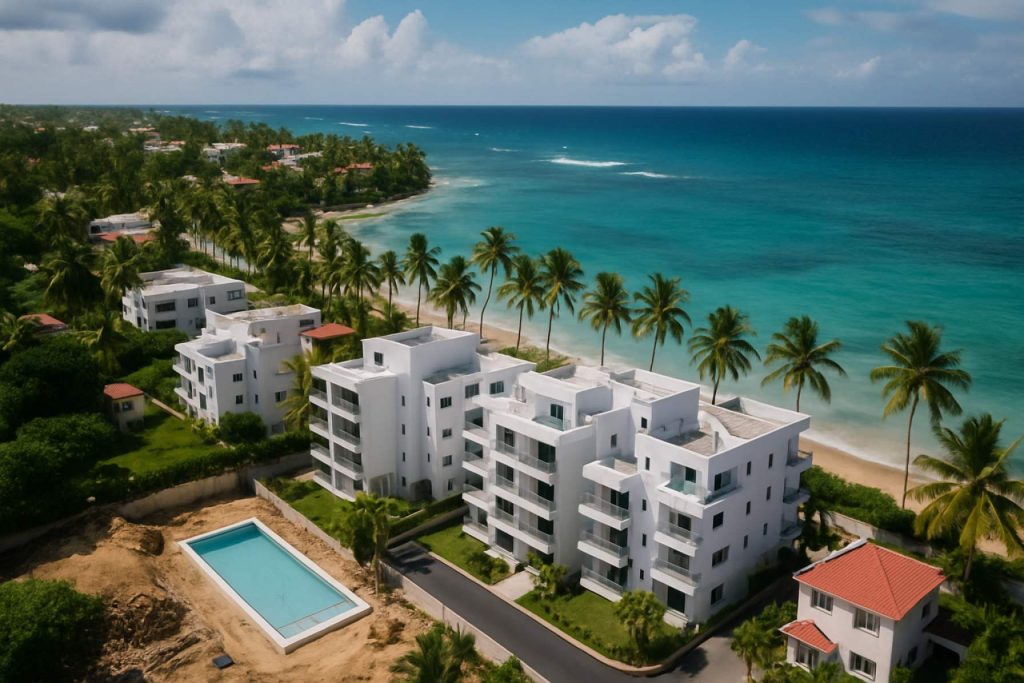
Table of Contents
- Executive Summary: Key Takeaways for 2025 and Beyond
- Dominican Republic Real Estate at a Glance: 2025 Key Statistics
- Market Drivers: Economic Growth, Tourism, and Urbanization
- Legal Framework: Property Ownership, Residency, and Compliance Requirements
- Taxation & Fiscal Incentives: What Buyers and Investors Must Know
- Foreign Investment Rules: Opportunities and Restrictions
- Prime Locations: Top Cities and Beachfront Hotspots in 2025
- Risks, Challenges, and Common Pitfalls for Investors
- Future Outlook: Forecasts for 2025–2030
- Official Resources & Guidance: Government and Institutional Contacts
- Sources & References
Executive Summary: Key Takeaways for 2025 and Beyond
The real estate sector in the Dominican Republic is poised for continued growth and transformation in 2025 and the following years, supported by robust foreign direct investment (FDI), evolving legislation, and increased government oversight. The sector remains a cornerstone of the country’s economic development, driven by tourism, expatriate demand, and infrastructure expansion.
- Legal and Regulatory Framework: Real estate transactions are governed by the Law 108-05 on Real Estate Registration and further regulated by the Law 288-04 on Real Estate Property Transfer. These laws stipulate due diligence, registration, and transfer processes, ensuring clear title and legal security for both domestic and foreign investors. In 2024, authorities enhanced compliance requirements to curb money laundering and fraud, aligning the sector with international anti-money laundering (AML) standards (Superintendencia del Mercado de Valores de la República Dominicana).
- Recent Events and Compliance Trends: The Dirección General de Impuestos Internos (DGII) has intensified oversight on property taxation and reporting, aiming to improve fiscal transparency. Recent amendments require more stringent identification of beneficial ownership and the declaration of all real estate assets by residents and non-residents. Foreign buyers continue to benefit from non-restrictive ownership laws, but compliance with tax and registration requirements is strictly enforced.
- Key Statistics: In 2023, FDI in real estate and tourism reached over US$1.1 billion, accounting for a significant share of the nation’s total FDI inflows (Banco Central de la República Dominicana). The demand for residential and vacation properties remains strong, with new developments concentrated in Punta Cana, Santo Domingo, and Puerto Plata.
- Market Outlook (2025 and Beyond): The Dominican government’s focus on infrastructure, hospitality, and regulatory modernization is expected to support sustainable growth. The sector faces challenges including rising construction costs, demand for affordable housing, and the need for digitalization of property registries. Nonetheless, the outlook remains positive, driven by tourism recovery, stable economic growth, and continued interest from international investors (Ministerio de Industria, Comercio y Mipymes).
In summary, the Dominican Republic’s real estate market offers significant opportunity, provided investors adhere to evolving legal and compliance obligations. Vigilance regarding regulatory updates and fiscal compliance will be critical for sustained success in 2025 and beyond.
Dominican Republic Real Estate at a Glance: 2025 Key Statistics
The Dominican Republic’s real estate sector continues to demonstrate robust growth into 2025, underpinned by strong tourism, rising foreign direct investment, and supportive government policies. The country remains a leading destination for both domestic and international investors, particularly in areas such as Punta Cana, Santo Domingo, and Puerto Plata.
-
Transaction Volumes and Foreign Investment: Official data from the
Banco Central de la República Dominicana
show that foreign direct investment (FDI) in real estate constituted a significant portion of total FDI in 2024, maintaining a positive trend into 2025. The tourism sector, closely tied to real estate, attracted over US$4 billion in FDI during 2023-2024, with similar levels projected for 2025. -
Legal and Compliance Framework: Real estate transactions are governed by the Dominican Civil Code and Law No. 108-05 on Real Estate Registration. The
Junta Central Electoral
and the
Suprema Corte de Justicia
oversee land registry and property rights. In recent years, digitalization of land records and streamlined registration have reduced transaction times and increased transparency, with the
Dirección General de Impuestos Internos (DGII)
ensuring tax compliance for property transfers. -
Key Market Statistics for 2025: According to estimates from the
Banco Central de la República Dominicana
and
Oficina Nacional de Estadística (ONE), the residential real estate sector is expected to grow at an annual rate of 5-6% in 2025. Luxury and coastal developments lead in value appreciation, while urban housing demand continues to rise due to domestic migration and demographic trends. -
Compliance and Regulatory Updates: In 2023-2024, the government introduced enhanced anti-money laundering (AML) measures applicable to real estate transactions, in line with recommendations from the
Superintendencia de Bancos. Market participants must now adhere to stricter client due diligence and reporting requirements, a trend expected to continue through 2025. - 2025 Outlook: The sector is poised for continued expansion, driven by infrastructure investments, growing international demand, and the government’s incentives for tourism and residential development. Risks include compliance with evolving AML regulations and maintaining sustainable growth in the face of global economic fluctuations.
Market Drivers: Economic Growth, Tourism, and Urbanization
The real estate sector in the Dominican Republic is poised for continued growth in 2025, underpinned by strong economic expansion, a robust tourism industry, and ongoing urbanization. The country’s GDP is expected to maintain its positive trajectory, with the Banco Central de la República Dominicana projecting real GDP growth around 5% for 2025. This economic stability is fostering investor confidence and increasing demand for both residential and commercial properties.
Tourism continues to be a primary engine for real estate demand. The Ministerio de Turismo reported a record 10 million visitors in 2023, and anticipates further increases through 2025 due to expanded air connectivity and new resort developments, particularly in Punta Cana, Samaná, and Puerto Plata. This influx is driving the construction of hotels, vacation rentals, and mixed-use developments, while also boosting the luxury and second-home market segments.
Urbanization trends are reshaping the real estate landscape, especially in Santo Domingo, Santiago, and La Romana. According to the Oficina Nacional de Estadística, urban population growth continues at over 2% annually, spurring demand for multifamily housing, retail centers, and office spaces. Infrastructure investments, such as highway expansions and new metro lines, are further supporting urban development and increasing land values in city peripheries.
Legally, the sector operates under the Real Estate Registration Law No. 108-05, with compliance overseen by the Jurisdicción Inmobiliaria. This framework ensures secure property titles and transaction transparency, which has been instrumental in attracting foreign investment. Additionally, the government’s continued support for investment incentives, including tax breaks in tourism and free trade zones, remains a key driver.
Looking ahead, the outlook for real estate in the Dominican Republic remains positive. The combination of macroeconomic resilience, government-backed infrastructure projects, and the country’s strategic position as a Caribbean tourism hub will likely sustain demand and foster new opportunities in both residential and commercial segments through 2025 and beyond.
Legal Framework: Property Ownership, Residency, and Compliance Requirements
The legal framework governing real estate in the Dominican Republic is characterized by robust property rights, a transparent land registration system, and regulations that are broadly welcoming to both domestic and foreign investors. Property ownership is regulated principally under the Law No. 108-05 on Real Estate Registration, which introduced significant modernization to the property registration process, ensuring legal certainty and facilitating electronic title searches. The Supreme Court of Justice oversees the registry system and provides jurisprudence on property disputes, reinforcing legal security for owners and investors.
Foreigners enjoy the same property ownership rights as Dominican nationals, with no restrictions on the acquisition of real estate by non-residents. The only exception applies to properties in border zones and certain protected areas, which may require special authorization from the Ministry of Defense and Ministry of Environment and Natural Resources. All property transactions require registration at the Title Registry Office under the Central Electoral Board and compliance with anti-money laundering protocols enforced by the Superintendence of Securities and Superintendency of Banks, particularly for high-value transactions.
The Dominican Republic offers several residency pathways that facilitate property investment. The General Directorate of Migration administers the residency process, including the “Investor Residency” category, which grants expedited residency to individuals investing at least US$200,000 in local real estate or businesses. Compliance requirements include proof of funds, criminal background checks, and, for companies, registration with the General Directorate of Internal Taxes for tax purposes.
- Property Transfer Tax: 3% of the government-appraised property value, payable upon registration (General Directorate of Internal Taxes).
- Annual Property Tax (IPI): Levied on real estate valued above RD$9,520,861 (2025 threshold), at a rate of 1% on the excess (General Directorate of Internal Taxes).
- Mandatory due diligence to verify title history, encumbrances, and compliance with zoning or environmental regulations (Ministry of Environment and Natural Resources).
Looking ahead to 2025 and beyond, ongoing digitalization of land records, stricter anti-money laundering enforcement, and increased demand for compliance transparency are expected. The government’s commitment to legal reforms and infrastructure development is projected to further strengthen the real estate sector’s attractiveness for both domestic and international investors (Presidency of the Dominican Republic).
Taxation & Fiscal Incentives: What Buyers and Investors Must Know
The Dominican Republic’s real estate sector continues to attract both domestic and foreign investors due to its favorable tax regime and targeted fiscal incentives. As of 2025, understanding the current taxation framework and available incentives is crucial for buyers and investors seeking to optimize returns while ensuring compliance.
Property Transfer and Ownership Taxes
When acquiring real estate, buyers must pay a property transfer tax of 3% of the property’s adjudicated value, as assessed by the General Directorate of Internal Taxes (Dirección General de Impuestos Internos). This tax applies to all individuals and legal entities acquiring real estate, with payments due within six months of the transaction. Delays result in surcharges and interest, underscoring the importance of timely compliance.
Annual property tax, known as Impuesto al Patrimonio Inmobiliario (IPI), is levied on properties exceeding DOP 9,520,861 (approx. USD 162,000 as of early 2025). The rate is 1% on the surplus value, although exemptions exist for certain primary residences and pensioners, as detailed by the Dirección General de Impuestos Internos.
Fiscal Incentives for Tourism and Development
The Tourism Incentive Law (Law No. 158-01) continues to be a linchpin for real estate investment. It grants a 15-year exemption from most national and municipal taxes—including transfer, property, and rental income taxes—for qualifying tourism projects and their buyers. As administered by the Ministerio de Turismo, these incentives have driven robust development in designated tourism areas, and the government reaffirmed their validity through 2025 and beyond to stimulate recovery and growth.
Taxation for Foreign Investors
Foreigners are subject to the same tax obligations and incentives as Dominicans. There are no restrictions on foreign property ownership. Rental income, whether earned by residents or non-residents, is taxable at standard rates (27% corporate, up to 25% personal). Proper declaration and withholding are required to avoid penalties, as overseen by the Dirección General de Impuestos Internos.
Outlook and Compliance
With the Dominican government’s ongoing emphasis on tax modernization and digitalization of filings, buyers and investors are urged to maintain accurate records and seek professional guidance. The authorities are increasing audits in the real estate sector, particularly in high-value and touristic zones. Looking ahead, the tax incentives are expected to remain a pillar of policy through at least 2027, supporting continued sector growth while requiring vigilant compliance from all market participants (Dirección General de Impuestos Internos).
Foreign Investment Rules: Opportunities and Restrictions
The Dominican Republic continues to attract significant foreign direct investment (FDI) in its real estate sector, buoyed by its stable macroeconomic environment, growing tourism industry, and robust legal framework. As of 2025, foreign nationals and entities enjoy a relatively open regime for acquiring, owning, and transferring real estate in the country, with minimal restrictions compared to many neighboring jurisdictions.
Under the prevailing legal system, foreigners are generally permitted to purchase and own real estate with the same rights as Dominican citizens. There are no legal limitations on the type or quantity of property a non-resident can acquire, whether for residential, commercial, or industrial purposes. The only stipulation is the proper registration of the property transaction with the national land registry, overseen by the Tribunal Superior de Tierras and the Jurisdicción Inmobiliaria, ensuring the protection of property rights and legal certainty.
A notable opportunity lies in the government’s ongoing push to stimulate tourism and related infrastructure, supported by incentives such as tax exemptions under Law No. 158-01 (Tourism Incentive Law). This law provides significant fiscal benefits for eligible projects, including exemptions from property, transfer, and income taxes for up to 15 years, facilitating greater foreign participation in hospitality and mixed-use developments (Ministerio de Turismo).
Compliance requirements for foreign buyers primarily involve due diligence on title verification, anti-money laundering (AML) checks, and adherence to registration protocols. The Dominican Republic enforces AML obligations in real estate transactions, in line with the Law No. 155-17 against Money Laundering and Terrorism Financing. Real estate professionals must report suspicious transactions and conduct customer due diligence as mandated by the Unidad de Análisis Financiero (Financial Analysis Unit).
According to the Banco Central de la República Dominicana, the real estate sector accounted for a significant share of total FDI inflows in 2024, with expectations of continued growth through 2025 and beyond. The outlook remains positive, driven by ongoing infrastructure projects, continued investor interest, and the country’s legal stability. Nevertheless, foreign investors are advised to engage qualified local legal counsel to navigate evolving regulations and ensure full compliance with registration and tax obligations.
Prime Locations: Top Cities and Beachfront Hotspots in 2025
In 2025, the Dominican Republic’s real estate sector continues to spotlight prime locations, with both urban centers and beachfront communities experiencing robust demand from domestic and international buyers. The capital, Santo Domingo, leads the urban market, benefiting from ongoing infrastructure projects and an expanding expatriate community. According to the Oficina Nacional de Estadística (ONE), Santo Domingo maintains its status as the most populous and economically dynamic city, which supports stable residential and commercial property markets.
Punta Cana remains the crown jewel among beachfront destinations. The region’s international airport, improved road connectivity, and favorable investment climate continue to attract foreign investors, particularly from North America and Europe. The Ministerio de Turismo reports that Punta Cana accounts for over 60% of the nation’s tourist arrivals, sustaining high occupancy rates and, consequently, strong returns for vacation rentals and resort-style developments. Cap Cana and Bávaro, within the Punta Cana area, are especially sought after for luxury condominiums and gated communities.
Puerto Plata, on the northern coast, is undergoing revitalization, bolstered by cruise port expansions and infrastructure upgrades. The Presidencia de la República Dominicana has highlighted ongoing investments in the Puerto Plata and Sosúa areas, which are expected to further stimulate the local real estate market through 2025 and beyond.
Cabarete and Las Terrenas are notable emerging hotspots, appealing to younger expatriates, digital nomads, and retirees. Both towns offer a blend of beachfront living and vibrant communities, with Las Terrenas in Samaná Province gaining attention for its French and Italian expatriate enclaves.
Legal compliance remains a priority for buyers, as all transactions require title verification through the Jurisdicción Inmobiliaria to avoid title fraud and ensure proper registration. Foreign buyers enjoy the same property rights as citizens, as stipulated by the Ley 108-05 de Registro Inmobiliario and amendments. Recent digitalization initiatives by the Jurisdicción Inmobiliaria have streamlined processes, but due diligence remains essential.
Looking ahead, the government’s ongoing infrastructure investments and incentives for tourism-related development are expected to sustain growth in prime locations. The outlook for 2025 and the coming years is positive, with continued demand, especially in coastal hotspots and urban centers, as highlighted by both government and industry sources.
Risks, Challenges, and Common Pitfalls for Investors
The Dominican Republic’s real estate sector continues to attract significant foreign and domestic investment, but it also presents several risks, challenges, and common pitfalls that investors should carefully consider in 2025 and beyond. Understanding the legal, regulatory, and practical landscape is essential for mitigating exposure and ensuring compliance.
Legal Framework and Title Security
- The Dominican real estate system is governed primarily by the Property Registry Law (Law No. 108-05), which establishes procedures for property registration and transfer. However, title insecurity remains a risk, as improper or incomplete documentation, unresolved liens, and historical land disputes can jeopardize ownership claims. Investors are strongly advised to verify title status through the official Jurisdicción Inmobiliaria and obtain a certificate of title before completing any transaction.
- The absence of a centralized, easily searchable registry for all encumbrances can complicate due diligence. Some areas, particularly rural or coastal zones, may have incomplete cadastral data, increasing the risk of overlapping claims or undisclosed restrictions.
Regulatory Compliance and Permitting
- Real estate projects—especially those involving tourism, hospitality, or coastal development—must comply with environmental regulations and obtain permits from authorities such as the Ministerio de Medio Ambiente y Recursos Naturales. Failure to secure these permits or to adhere to zoning and land use rules can result in project delays, fines, or even demolition orders.
- The anti-money laundering regime, updated by Law No. 155-17, imposes obligations on real estate professionals and investors to report suspicious transactions to the Dirección General de Impuestos Internos and the Financial Analysis Unit. Non-compliance can lead to severe penalties and reputational damage.
Market Volatility and Fraud
- While the sector posted robust growth in prior years, the market faces potential headwinds in 2025 due to global economic uncertainty and local regulatory adjustments. Fluctuations in demand, especially in tourist-driven markets, could affect property values and rental yields, as noted in recent bulletins by the Banco Central de la República Dominicana.
- Fraudulent schemes, such as double-selling of properties or forged documentation, remain a concern. Investors should work with licensed attorneys and brokers registered with the Superintendencia de Bancos (for mortgage financing) or the Centro de Exportación e Inversión de la República Dominicana for investment guidance.
In summary, while the Dominican Republic offers attractive opportunities in real estate, investors must navigate a complex legal and regulatory environment, exercise diligent due diligence, and remain alert to evolving compliance requirements and market dynamics.
Future Outlook: Forecasts for 2025–2030
The future outlook for real estate in the Dominican Republic from 2025 to 2030 appears promising, underpinned by continued economic growth, robust tourism, and supportive government initiatives. The sector is expected to benefit from both domestic demand and sustained interest from foreign investors, particularly in resort and residential developments along the country’s northern and eastern coasts.
According to projections by the Central Bank of the Dominican Republic, the national economy is forecast to maintain a steady growth trajectory, with GDP growth rates averaging around 5% annually through 2030. This economic stability, combined with government incentives, is likely to stimulate further investment in real estate, especially in tourism-related infrastructure and residential projects targeting expatriates and retirees.
On the legislative front, recent and forthcoming reforms are set to enhance transparency and streamline the property acquisition process. The General Directorate of Internal Taxes (DGII) continues to enforce property tax regulations and anti-money laundering compliance, ensuring that real estate transactions adhere to international standards. Additionally, the Supreme Court of the Dominican Republic has supported efforts to modernize land registry systems, reducing the risk of title disputes and expediting transaction timelines.
Key statistics indicate sustained growth in real estate transactions. The Central Bank reported a 9% annual increase in mortgage lending in 2024, with similar or higher figures anticipated through 2025–2030, driven by both local buyers and foreign nationals. Tourism arrivals, a major driver of demand for vacation properties and rental investments, are projected to surpass 10 million annually by 2030, according to the Ministry of Tourism.
Compliance requirements are expected to tighten further, with ongoing implementation of anti-money laundering directives and enhanced due diligence for foreign buyers. The government is also investing in infrastructure improvements, such as new highways and airport expansions, which will open up additional areas for development, especially in emerging coastal regions.
In summary, the Dominican Republic’s real estate market is poised for robust expansion over the next five years, supported by favorable economic conditions, proactive legal reforms, and increasing international demand. Investors are advised to remain vigilant regarding compliance obligations but can expect a dynamic and evolving landscape through 2030.
Official Resources & Guidance: Government and Institutional Contacts
For individuals and entities interested in real estate in the Dominican Republic, accessing official resources and institutional guidance is crucial for ensuring legal compliance and informed decision-making. The Dominican government has established several agencies and platforms that provide up-to-date information, regulatory frameworks, and support services relevant to property acquisition, ownership, and investment.
-
General Directorate of Internal Taxes (DGII):
The Dirección General de Impuestos Internos is responsible for the administration and collection of property taxes, as well as providing guidance on the fiscal obligations associated with real estate transactions. The DGII offers resources for understanding property valuation, annual tax rates, and payment procedures. -
Registry of Titles:
The Registro de Títulos operates under the Judicial Power and is charged with the registration and certification of land titles. This institution is essential for verifying property ownership, conducting due diligence, and ensuring that transactions are properly recorded to guarantee legal security. -
Ministry of Tourism:
The Ministerio de Turismo provides resources and regulatory information for foreign investors and developers, particularly for projects in tourism zones. They offer official guidelines on incentives, permits, and compliance requirements relevant to hotel, resort, and vacation property developments. -
Ministry of Foreign Affairs:
The Ministerio de Relaciones Exteriores issues guidelines and support for foreign nationals regarding property rights, investment procedures, and residency or visa requirements linked to real estate ownership. -
Superintendency of Banks:
The Superintendencia de Bancos supervises financial institutions involved in mortgage lending and offers information on banking compliance, anti-money laundering regulations, and the requirements for non-residents to obtain financing for property purchases. -
Bar Association of the Dominican Republic:
The Colegio de Abogados de la República Dominicana provides directories of licensed legal practitioners specializing in real estate law, facilitating access to professional legal assistance for transactions, title reviews, and dispute resolution.
These official resources are vital for navigating the evolving legal, fiscal, and procedural landscape of Dominican real estate in 2025 and beyond. Parties are encouraged to consult these institutions directly to ensure compliance with all current regulations, obtain up-to-date documentation, and access professional guidance tailored to their specific needs.
Sources & References
- Law 108-05 on Real Estate Registration
- Banco Central de la República Dominicana
- Ministry of Environment and Natural Resources
- General Directorate of Migration
- General Directorate of Internal Taxes
- Presidency of the Dominican Republic
- Banco Central de la República Dominicana
- Oficina Nacional de Estadística (ONE)
- Ministerio de Relaciones Exteriores



